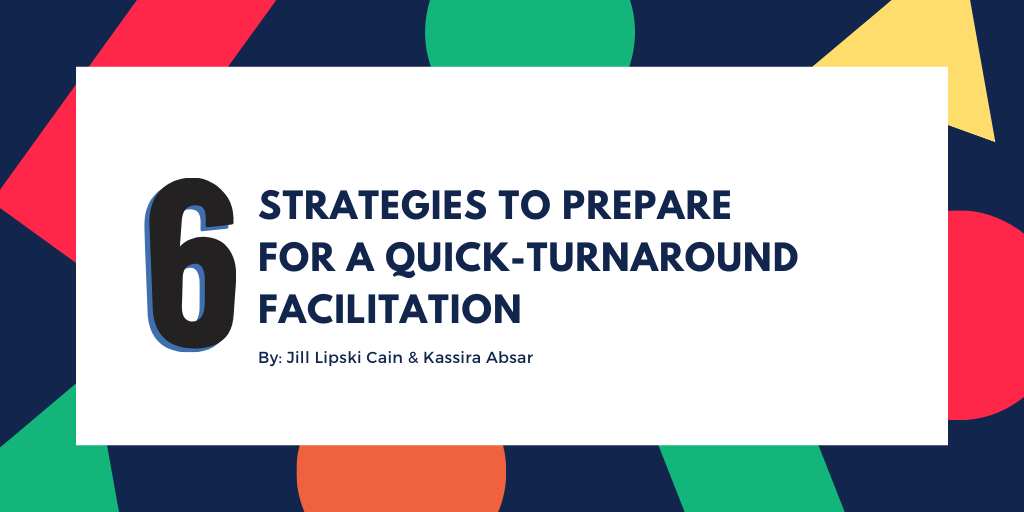
 Hey—we’re Kassira Absar and Jill Lipski Cain, consultants here at The Improve Group (IG). For this month’s IG-ology, we wanted to share some tips and strategies to help you prepare to facilitate a group on a very tight timeline.
Hey—we’re Kassira Absar and Jill Lipski Cain, consultants here at The Improve Group (IG). For this month’s IG-ology, we wanted to share some tips and strategies to help you prepare to facilitate a group on a very tight timeline.
For us, these are real-life lessons: We recently collaborated with a client that needed facilitation services quickly—more quickly than our typical schedule for planning a high-quality engagement. Adding to the tight timeline was a tense topic that heightened the need for thoughtfulness. The client was bringing together stakeholders with varying perspectives to discuss a health-care issue that has significant consequences for people’s quality of life and livelihoods.
Despite these powerful headwinds, we ended the project with a very positive outcome. What could have been a disorganized process went smoothly. We credit that positive outcome to the client’s commitment to a successful event and our team’s thorough planning process. Here are some takeaways that we believe can help others prepare for quick-turnaround facilitation:
- Keep purpose prominent: If you’re flying toward facilitation at the speed of light, center on purpose and roles. We find that creating space to establish our role as facilitators, understand what facilitation means to a client, and focus on what they hope to get out of it helps us successfully meet their needs. We also use this time as an opportunity to be a voice for participants, prompting clients to think about what they will do in response to participant input and how those actions can be communicated back to participants.
- Consider your final product: It’s useful to think about documentation or reporting objectives ahead of facilitation. Discussing these details beforehand allows us to help a client determine what they want to result from the workshop and to plan logistically for priority areas for notetaking during the workshop.
- Communication is key: As the facilitation approached, we sensed some ambiguity. Clearing up the ambiguity was as simple as pausing with the client to confirm the details and repeat back our understanding of their needs. This communication created clarity that allowed us to work within the tight timeline.
- Orientation really helps: It isn’t relevant in every case, but this event involved our client’s staff facilitating several small groups at tables throughout the workshop. Because we didn’t have time for a meeting before the facilitation, we prepared instructional packets for each table facilitator and provided a short orientation just before the workshop. This helped build rapport between our team and the table facilitators and helped them understand their role and how the notes they took would be used.
- Build in flexibility: Given the short turnaround, having room for last-minute changes based on feedback in the room was key. This also meant building in time for flexibility. Leaving space in the schedule for the unexpected will help an event go smoothly, even if things don’t end up exactly as you’d planned.
- Prioritize accessibility: Particularly if a facilitation space is booked at the last minute, scan the room upon arrival to make sure it’s as accessible as possible. For this project, our team moved tables and seating into a setup that made the space more accommodating for people in wheelchairs, allowing for a more comfortable experience and more authentic engagement.
We love thinking about ways to make facilitation opportunities more useful for clients and more engaging for participants. If this sounds like something you’re interested in discussing, feel free to reach out—no matter the timeline.
